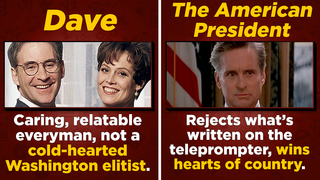How Hollywood Inadvertently Paved The Path For Trump

In case you hadn't noticed or bludgeoned your head with a large rock until all knowledge of current events had been purged from your brain, there's a Presidential election this week. And while it's easy for many of us to dismiss Trumpism as a movement born out of racism, ignorance, and America's previously untapped horniness for red baseball caps, we'd like to add that Trump adeptly exploited a narrative that's been perpetuated for decades by the unlikeliest of places: Hollywood. (And we don't mean the reality TV stuff.)
For starters, many of the political comedies we grew up with taught us that any random non-politician is somehow inherently better than an actual politician. Take Dave, the charming romantic comedy starring Kevin Kline as the titular celebrity impersonator who takes over for the President who is in some kind of sex-induced coma.
Don't Miss
When Dave is in office, he becomes a much better President than the real guy, purely because he's a political outsider. Suddenly the Commander-in-Chief is a caring, relatable everyman, not a cold-hearted Washington elitist. Similarly, in The Distinguished Gentleman, Eddie Murphy plays a conman who lies his way into congress and roots out government corruption. And in Man of the Year, Robin Williams stars as a TV host who runs for President and refreshingly says whatever he feels like, even if much of it is "not politically correct."
Even a movie like My Fellow Americans, which is about two aging ex-Presidents, inadvertently illustrated that it's easier to affect change as a non-politician (though it's hard to imagine anyone enjoying the story of two elderly bickering men from opposing parties ever again after the recent debates). Meanwhile, Warren Beatty's Bulworth told the story of a washed-up Senator who reinvigorates his career by suddenly being honest about issues like income inequality and institutional racism. Unfortunately, this newfound authenticity also involves unnecessarily invoking racist stereotypes and, even more, unfortunately, rapping.
Of course, Trump ran on being a Washington outsider who repeatedly "denounced" political correctness. A lot of Americans may hate the way Trump's verbal diarrhea flows unfiltered from his spray tan-addled brain to his KFC-encrusted mouth. But that's what movies taught us is the hallmark of a good politician. Trump often brags that he doesn't use a teleprompter, which is probably why his rallies play like seniors' open mic night at the Adderall factory. The climax of Aaron Sorkin's The American President literally involves President Michael Douglas rejecting what is written on his teleprompter, thus winning the hearts of everyone in the country.
Trump "co-opted Sorkin's style," exploiting Hollywood's dramatic conceit that earnest, uncompromising political statements can't be written down in advance for some reason. President Bartlet from Sorkin's liberal fantasy The West Wing also laid the groundwork for Trump. Not just because both actively concealed medical diagnoses from the public, but both Bartlet and Trump's campaign strategies were to just let their respective candidates say whatever the fuck popped into their heads.


Trump is just another example of how, not unlike Steven Segal, something that seems cool in a movie might be goddamn horrifying in real life.
You (yes, you) should follow JM on Twitter! And check out the podcast Rewatchability
Top Image: Warner Bros.